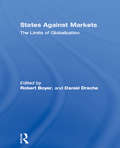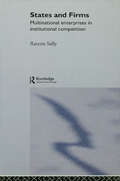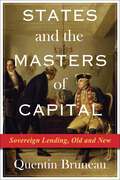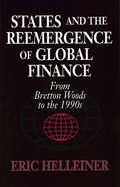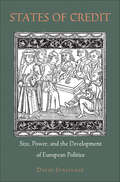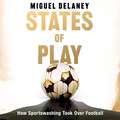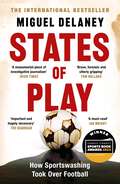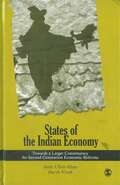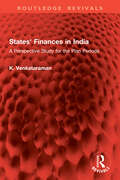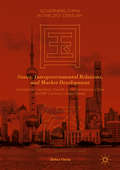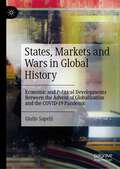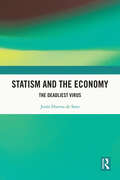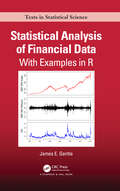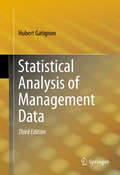- Table View
- List View
Statement of Cash Flows
by Jacob Cohen David F. HawkinsDiscusses the components of the statement of cash flow and its direct and indirect format of presentation. Also briefly explains the difference between cash and accrual accounting and provides examples of Standard Microsystems Corp. and Intel Corp.
Statement of Cash Flows: Preparation, Presentation, and Use (Aicpa Ser.)
by Tom KlammerStatement of Cash Flows: Preparation, Presentation, and Use by Tom Klammer
Statements of Cash Flows: Three Examples
by William J. Bruns Jr. Julie H. HertensteinThis case introduces the statement of cash flow through three examples of multi-year statements of cash flows from three unidentified companies.
Statements of Cash Flows: Three Examples
by William J. Bruns Jr. Julie H. HertensteinThis case introduces the statement of cash flow through three examples of multi-year statements of cash flows from three unidentified companies.
States Against Markets: The Limits of Globalization (Routledge Studies in Governance and Change in the Global Era)
by Daniel Drache Robert BoyerThis work challenges the popular view that globalization threatens the role of the nation-state in determining national policy. It examines the fundamental issue of competitiveness and market power in an increasingly borderless and co-dependent world. Despite this increased threat to the nation-state as an effective manager of the national economy, the authors argue that there are a number of options and alternatives open to governments to protect themselves from the global business cycle.
States and Firms: Multinational Enterprises in Institutional Competition (Routledge Studies in International Business and the World Economy #1)
by Razeen SallyFirst published in 1995. Routledge is an imprint of Taylor & Francis, an informa company.
States and Markets in Hydrocarbon Sectors
by Andrei V. Belyi Kim TalusResearch on the role of states and markets in the hydrocarbon sector is highly topical in contemporary International Political Economy. This edited collection will approach this subject from a broader perspective, investigating the very essence of the interaction between the state and the market and how this varies on a regional basis.
States and the Masters of Capital: Sovereign Lending, Old and New (Columbia Studies in International Order and Politics)
by Quentin BruneauToday, states’ ability to borrow private capital depends on stringent evaluations of their creditworthiness. While many presume that this has long been the case, Quentin Bruneau argues that it is a surprisingly recent phenomenon—the outcome of a pivotal shift in the social composition of financial markets.Investigating the financiers involved in lending capital to sovereigns over the past two centuries, Bruneau identifies profound changes in their identities, goals, and forms of knowledge. He shows how an old world made up of merchant banking families pursuing both profit and status gradually gave way to a new one dominated by large companies, such as joint stock banks and credit rating agencies, exclusively pursuing profit. Lacking the web of personal ties to sovereigns across the world that their established rivals possessed, these financial institutions began relying on a different form of knowledge created to describe and compare states through quantifiable data: statistics. Over the course of this epochal shift, which only came to an end a few decades ago, financial markets thus reconceptualized states. Instead of a set of individuals to be known in person, they became numbers on a page. Raising new questions about the history of sovereign lending, this book illuminates the nature of the relationship between states and financial markets today—and suggests that it may be on the cusp of another major transformation.
States and the Reemergence of Global Finance: From Bretton Woods to the 1990s
by Eric HelleinerMost accounts explain the postwar globalization of financial markets as a product of unstoppable technological and market forces. Drawing on extensive historical research, Eric Helleiner provides the first comprehensive political history of the phenomenon, one that details and explains the central role played by states in permitting and encouraging financial globalization. Helleiner begins by highlighting the commitment of advanced industrial states to a restrictive international financial order at the 1944 Bretton Woods conference and during the early postwar years. He then explains the growing political support for the globalization of financial markets after the late 1950s by analyzing five sets of episodes: the creation of the Euromarket in the 1960s, the rejection in the early 1970s of proposals to reregulate global financial markets, four aborted initiatives in the late 1970s and early 1980s to implement effective controls on financial movements, the extensive liberalization of capital controls in the 1980s, and the containment of international financial crises at three critical junctures in the 1970s and 1980s. He shows that these developments resulted from various factors, including the unique hegemonic interests of the United States and Britain in finance, a competitive deregulation dynamic, ideological shifts, and the construction of a crisis-prevention regime among leading central bankers. In his conclusion Helleiner addresses the question of why states have increasingly embraced an open, liberal international financial order in an era of considerable trade protectionism.
States in the Developing World
by Atul Kohli Deborah J. Yashar Miguel Centeno Dinsha MistreeWhat should states in the developing world do and how should they do it? How have states in the developing world addressed the challenges of promoting development, order, and inclusion? States in the developing world are supposed to build economies, control violence, and include the population. How they do so depends on historical origins and context as well as policy decisions. This volume presents a comprehensive theory of state capacity, what it consists of, and how it may be measured. With historical empirical illustrations it suggests that historical origins and political decisions help drive the capacity of states to meet their goals.
States of Childhood: From the Junior Republic to the American Republic, 1895-1945
by Jennifer S. LightHow "virtual adulthood"--children's role play in simulated cities, states, and nations--helped construct a new kind of "sheltered" childhood for American young people.A number of curious communities sprang up across the United States in the late nineteenth and early twentieth century: simulated cities, states, and nations in which children played the roles of legislators, police officers, bankers, journalists, shopkeepers, and other adults. They performed real work--passing laws, growing food, and constructing buildings, among other tasks--inside virtual worlds. In this book, Jennifer Light examines the phenomena of "junior republics" and argues that they marked the transition to a new kind of "sheltered" childhood for American youth. Banished from the labor force and public life, children inhabited worlds that mirrored the one they had left.
States of Credit: Size, Power, and the Development of European Polities (The Princeton Economic History of the Western World #35)
by David StasavageStates of Credit provides the first comprehensive look at the joint development of representative assemblies and public borrowing in Europe during the medieval and early modern eras. In this pioneering book, David Stasavage argues that unique advances in political representation allowed certain European states to gain early and advantageous access to credit, but the emergence of an active form of political representation itself depended on two underlying factors: compact geography and a strong mercantile presence. Stasavage shows that active representative assemblies were more likely to be sustained in geographically small polities. These assemblies, dominated by mercantile groups that lent to governments, were in turn more likely to preserve access to credit. Given these conditions, smaller European city-states, such as Genoa and Cologne, had an advantage over larger territorial states, including France and Castile, because mercantile elites structured political institutions in order to effectively monitor public credit. While creditor oversight of public funds became an asset for city-states in need of finance, Stasavage suggests that the long-run implications were more ambiguous. City-states with the best access to credit often had the most closed and oligarchic systems of representation, hindering their ability to accept new economic innovations. This eventually transformed certain city-states from economic dynamos into rentier republics. Exploring the links between representation and debt in medieval and early modern Europe, States of Credit contributes to broad debates about state formation and Europe's economic rise.
States of Obligation
by Yanni KotsonisBeginning in the 1860s, the Russian Empire replaced a poll tax system that originated with Peter the Great with a modern system of income and excise taxes. Russia began a transformation of state fiscal power that was also underway across Western Europe and North America. States of Obligation is the first sustained study of the Russian taxation system, the first to study its European and transatlantic context, and the first to expose the essential continuities between the fiscal practices of the Russian Empire and the Soviet Union.Using a wealth of materials from provincial and local archives across Russia, Yanni Kotsonis examines how taxation was simultaneously a revenue-raising and a state-building tool, a claim on the person and a way to produce a new kind of citizenship. During successive political, wartime, and revolutionary crises between 1855 and 1928, state fiscal power was used to forge social and financial unity and fairness and a direct relationship with individual Russians. State power eventually overwhelmed both the private sector economy and the fragile realm of personal privacy. States of Obligation is at once a study in Russian economic history and a reflection on the modern state and the modern citizen.
States of Play: How Sportswashing Took Over Football
by Miguel Delaney'A must-read on how modern football works.' - Ian Wright'In this excellent investigation, Delaney reveals the ugly side of the beautiful game.' - Oliver Bullough'Brave, forensic and utterly gripping.' - Tom Holland'Majestic... the essential guide to how the people's game has become the plaything of the very rich and powerful.' - Jonathan Wilson______________________________The definitive account of how capitalism and the world's elite corrupted modern footballAs the 2022 World Cup in Qatar drew to a close, there was a bitter undercurrent to Argentina's triumph. Throughout the tournament, numerous allegations of sportswashing and financial misconduct had been made against the state of Qatar, moving what had previously been a smaller conversation into the worldwide spotlight. The question had been asked, who really owns and runs football? Journeying from Abu Dhabi to Newcastle, and onto London, Paris, Moscow and New York, journalist Miguel Delaney investigates the allegations of sportswashing and misconduct in the beautiful game. The result is a gripping account of how football has been taken over by the world's wealthiest businessmen, state-backed corporations, media tycoons and oil-rich oligarchs. From Neymar's £198 million transfer to Paris Saint-Germain and Abu Dhabi's construction empire in Manchester to failed Financial Fair Play constraints and the dawn of the European Super League, Miguel draws on exclusive interviews and unprecedented access to key stakeholders to produce an all-encompassing exposé of modern footballs highest echelons.Authoritative, riveting and eye-opening, States of Play reveals how football has become a tool for the world's elite.______________________________'Delaney's diligence and determination to hold authorities to account is the moral compass that the game needs.' - Andy Brassell'The most important football book of its generation.' - Jack Pitt-Brooke'An eye-opening and essential investigation into the forces shaping the world's most popular sport.' - Joshua Robinson & Jonathan Clegg'This book tackles the major issue affecting football today with fearlessness and forensic scrutiny. An important investigation for our times.' - Laurie Whitwell
States of Play: How Sportswashing Took Over Football | The International Bestseller & Winner of the Football Book of the Year Award
by Miguel DelaneyTHE INTERNATIONAL BESTSELLER & WINNER OF THE FOOTBALL BOOK OF THE YEAR AWARDA TIMES SPORTS BOOK OF THE YEARA TELEGRAPH BOOK OF THE YEARAN IRISH TIMES BOOK OF THE YEARAN IRISH INDEPENDENT BOOK OF THE YEAR'Important, perfectly timed and hugely necessary.' The Guardian'A monumental piece of investigative journalism.' Irish Times'A must-read on how modern football works.' Ian Wright'Brave, forensic and utterly gripping.' Tom Holland______________________________The definitive account of how capitalism and the world's elite corrupted modern football. Fully updated to cover Saudi Arabia's 2034 World Cup bid, the Manchester City charges case and PSG winning the Champions League.As the 2022 World Cup in Qatar drew to a close, there was a bitter undercurrent to Argentina's triumph. Throughout the tournament, numerous allegations of sportswashing and financial misconduct had been made against the state of Qatar, moving what had previously been a smaller conversation into the worldwide spotlight.The question had been asked, who really owns and runs football?Journeying from Abu Dhabi to Newcastle, and onto London, Paris, Moscow and New York, journalist Miguel Delaney investigates the allegations of sportswashing and misconduct in the beautiful game. The result is a gripping account of how football has been taken over by the world's wealthiest businessmen, state-backed corporations, media tycoons and oil-rich oligarchs.From Neymar's £198 million transfer to Paris Saint-Germain and Abu Dhabi's construction empire in Manchester to failed Financial Fair Play constraints and the dawn of the European Super League, Miguel draws on exclusive interviews and unprecedented access to key stakeholders to produce an all-encompassing exposé of modern footballs highest echelons.Authoritative, riveting and eye-opening, States of Play reveals how football has become a tool for the world's elite.______________________________Miguel Delaney's STATES OF PLAY was ranked in the Irish Times bestsellers list the weeks of 11th-18th November & 9th December 2024.
States of Play: How Sportswashing Took Over Football | The International Bestseller & Winner of the Football Book of the Year Award
by Miguel DelaneyTHE INTERNATIONAL BESTSELLER & WINNER OF THE FOOTBALL BOOK OF THE YEAR AWARDA TIMES SPORTS BOOK OF THE YEARA TELEGRAPH BOOK OF THE YEARAN IRISH TIMES BOOK OF THE YEARAN IRISH INDEPENDENT BOOK OF THE YEAR'Important, perfectly timed and hugely necessary.' The Guardian'A monumental piece of investigative journalism.' Irish Times'A must-read on how modern football works.' Ian Wright'Brave, forensic and utterly gripping.' Tom Holland______________________________The definitive account of how capitalism and the world's elite corrupted modern football. Fully updated to cover Saudi Arabia's 2034 World Cup bid, the Manchester City charges case and PSG winning the Champions League.As the 2022 World Cup in Qatar drew to a close, there was a bitter undercurrent to Argentina's triumph. Throughout the tournament, numerous allegations of sportswashing and financial misconduct had been made against the state of Qatar, moving what had previously been a smaller conversation into the worldwide spotlight.The question had been asked, who really owns and runs football?Journeying from Abu Dhabi to Newcastle, and onto London, Paris, Moscow and New York, journalist Miguel Delaney investigates the allegations of sportswashing and misconduct in the beautiful game. The result is a gripping account of how football has been taken over by the world's wealthiest businessmen, state-backed corporations, media tycoons and oil-rich oligarchs.From Neymar's £198 million transfer to Paris Saint-Germain and Abu Dhabi's construction empire in Manchester to failed Financial Fair Play constraints and the dawn of the European Super League, Miguel draws on exclusive interviews and unprecedented access to key stakeholders to produce an all-encompassing exposé of modern footballs highest echelons.Authoritative, riveting and eye-opening, States of Play reveals how football has become a tool for the world's elite.______________________________Miguel Delaney's STATES OF PLAY was ranked in the Irish Times bestsellers list the weeks of 11th-18th November & 9th December 2024.
States of the Indian Economy: Towards a Larger Constituency for Second Generation Economic Reforms
by Amir Ullah Khan Harsh VivekThe phenomenal rise of India in the global economy has been attributed to a whole host of factors, the major ones being the focus on economic reforms and the demographic dividend that India currently enjoys due to its demographic transition. The large pool of human capital - a young, talented and well-educated workforce - is one of the major drivers of economic growth in the country. Rapid strides in knowledge-based industries, especially information technology, biotechnology and pharmaceuticals; rejuvenation of the manufacturing sector, revolution in the agriculture sector; and, resurgence in exports have made India one of the fastest growing economies in the world. A market-oriented approach to development, opening up of the economy and the growing economies of scale and scope for Indian enterprises, access to ′modern′ technology - especially information technology - and growth in entrepreneurship have made India a sought-after destination for foreign investment. The authors argue that this situation is a result of the implementation of a set of first generation economic reforms, initiated primarily by the Central government but the responsibilities of which are now on the State governments. To carry the second generation of reforms forward in a meaningful manner, action has now shifted to the states. With this background, this book primarily examines the following: - The state of the Indian economy after one and a half decades of liberalisation and its role in the fast changing global economy - The economic performance of various Indian states during this period - Sectors that have done well and those that need substantial improvement in terms of adoption and implementation of reform measures.
States' Finances in India: A Perspective Study for the Plan Periods (Routledge Revivals)
by K. VenkataramanFirst published in 1968, States' Finances in India not only provides the first descriptive account of the finances of the states since Indian Independence, but also offers an analysis which successfully puts into perspective national, state and local finance on the one hand and problems of plan financing, taxation, borrowing and public expenditure on the other. The author supports his argument by a series of statistical tables on which he comments concisely, bringing out clearly their main features and implications. His analysis benefits from his practical experience of politics and administration.He deals with union-state relations, state-local relations and problems of plan financing and implementation. Most of the statistical tables are aggregated from successive annual reports and will make this a valuable work of reference for economists, administrators and politicians.
States, Intergovernmental Relations, and Market Development: Comparing Capitalist Growth In Contemporary China And 19th-century United States (Governing China In The 21st Century Ser.)
by Jinhua ChengThis book is a theoretical and empirical analysis of institutional foundation of long-term economic growth from the perspective of state-market and central-local relations. The book argues that, in order to safeguard sustainable market development, it is necessary to centralize certain functions of the state to overcome local predatory governmental rulings, and to decentralize others to increase local governmental market incentives, simultaneously. This institutional approach is conceptualized as “Dual Intergovernmental Transformation for Market Development” (DITMD). This book develops the DITMD model through an in-depth empirical comparison on contemporary China and the 19th-century United States.
States, Markets and Wars in Global History: Economic and Political Developments Between the Advent of Globalization and the COVID-19 Pandemic
by Giulio SapelliThis wide-ranging book focuses on the economic and political changes that have taken place between the advent of globalization and the COVID-19 pandemic and assesses how this may bring about a profound reconfiguration of the global political system. Sapelli considers a range of developments in different spheres, from international to national politics, military aggressions, and worldwide political trends such as the rise of populism, to illuminate the moment of neoliberal crisis in which we now live. He argues that Europe and its institutions in particular no longer demonstrate a model of diplomacy and statesmanship, with the rise of technocratic structures and elitism reflecting how an ideal of ‘global convergence’ towards liberalism and democracy no longer holds true. The book then considers how a new international order based on the reason of state can be brought about by global cooperation between the US, Russia and China, along with a return to properly regulated finance and a renewed focus on community in the wake of the coronavirus pandemic. The book will be of interest to those working in international economics and international relations, as well as academics of economic history and political economy.
Statism and the Economy: The Deadliest Virus
by Jesús Huerta de SotoFeaturing essays on topics ranging from the pandemic to antideflationist paranoia and the crisis of classical liberalism, this volume explores the various ways in which socialism statism is the ‘deadliest virus’ which constantly endangers the spontaneous process of social cooperation. Drawing on the Austrian School of economics, the book includes writings on the monetary policy of the European Central Bank and the economics of pandemics, economic cycles, Japanization and deflation, the crisis of classical liberalism versus anarchocapitalism, market socialism and nationalism, and the relations between efficiency and ethics. This book will be of great interest to those engaged with the study of Austrian economics, economic methodology, the monetary policy of the European Central Bank, the economic theory of pandemics, the theory of banking and economic cycles, the theory of dynamic efficiency and the history of economic thought.
Statism and the Economy: The Deadliest Virus
by Jesús Huerta de SotoFeaturing essays on topics ranging from the pandemic to antideflationist paranoia and the crisis of classical liberalism, this volume explores the various ways in which socialism statism is the ‘deadliest virus’ which constantly endangers the spontaneous process of social cooperation. Drawing on the Austrian School of economics, the book includes writings on the monetary policy of the European Central Bank and the economics of pandemics, economic cycles, Japanization and deflation, the crisis of classical liberalism versus anarchocapitalism, market socialism and nationalism, and the relations between efficiency and ethics. This book will be of great interest to those engaged with the study of Austrian economics, economic methodology, the monetary policy of the European Central Bank, the economic theory of pandemics, the theory of banking and economic cycles, the theory of dynamic efficiency and the history of economic thought.
Statistical Analysis for Decision Makers in Healthcare: Understanding and Evaluating Critical Information in Changing Times
by Jeffrey C. BauerAmericans are bombarded with statistical data each and every day, and healthcare professionals are no exception. All segments of healthcare rely on data provided by insurance companies, consultants, research firms, and the federal government to help them make a host of decisions regarding the delivery of medical services. But while these health pro
Statistical Analysis of Financial Data: With Examples In R (Chapman & Hall/CRC Texts in Statistical Science)
by James GentleStatistical Analysis of Financial Data covers the use of statistical analysis and the methods of data science to model and analyze financial data. The first chapter is an overview of financial markets, describing the market operations and using exploratory data analysis to illustrate the nature of financial data. The software used to obtain the data for the examples in the first chapter and for all computations and to produce the graphs is R. However discussion of R is deferred to an appendix to the first chapter, where the basics of R, especially those most relevant in financial applications, are presented and illustrated. The appendix also describes how to use R to obtain current financial data from the internet. Chapter 2 describes the methods of exploratory data analysis, especially graphical methods, and illustrates them on real financial data. Chapter 3 covers probability distributions useful in financial analysis, especially heavy-tailed distributions, and describes methods of computer simulation of financial data. Chapter 4 covers basic methods of statistical inference, especially the use of linear models in analysis, and Chapter 5 describes methods of time series with special emphasis on models and methods applicable to analysis of financial data. Features * Covers statistical methods for analyzing models appropriate for financial data, especially models with outliers or heavy-tailed distributions. * Describes both the basics of R and advanced techniques useful in financial data analysis. * Driven by real, current financial data, not just stale data deposited on some static website. * Includes a large number of exercises, many requiring the use of open-source software to acquire real financial data from the internet and to analyze it.
Statistical Analysis of Management Data
by Hubert GatignonStatistical Analysis of Management Data provides a comprehensive approach to multivariate statistical analyses that are important for researchers in all fields of management, including finance, production, accounting, marketing, strategy, technology, and human resources. This book is especially designed to provide doctoral students with a theoretical knowledge of the concepts underlying the most important multivariate techniques and an overview of actual applications. It offers a clear, succinct exposition of each technique with emphasis on when each technique is appropriate and how to use it. This second edition, fully revised, updated, and expanded, reflects the most current evolution in the methods for data analysis in management and the social sciences. In particular, it places a greater emphasis on measurement models, and includes new chapters and sections on: confirmatory factor analysis canonical correlation analysis cluster analysis analysis of covariance structure multi-group confirmatory factor analysis and analysis of covariance structures. Featuring numerous examples, the book may serve as an advanced text or as a resource for applied researchers in industry who want to understand the foundations of the methods and to learn how they can be applied using widely available statistical software.


